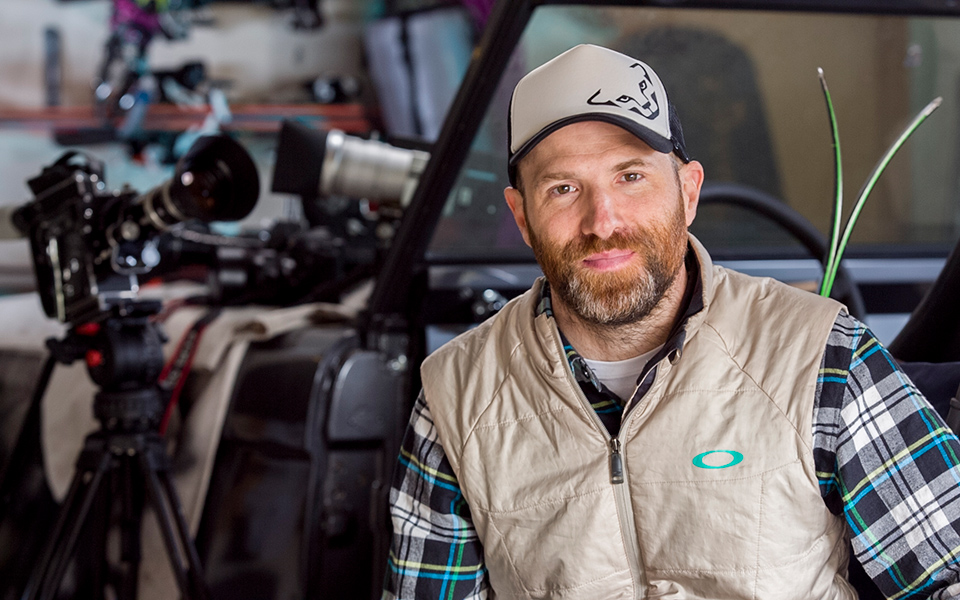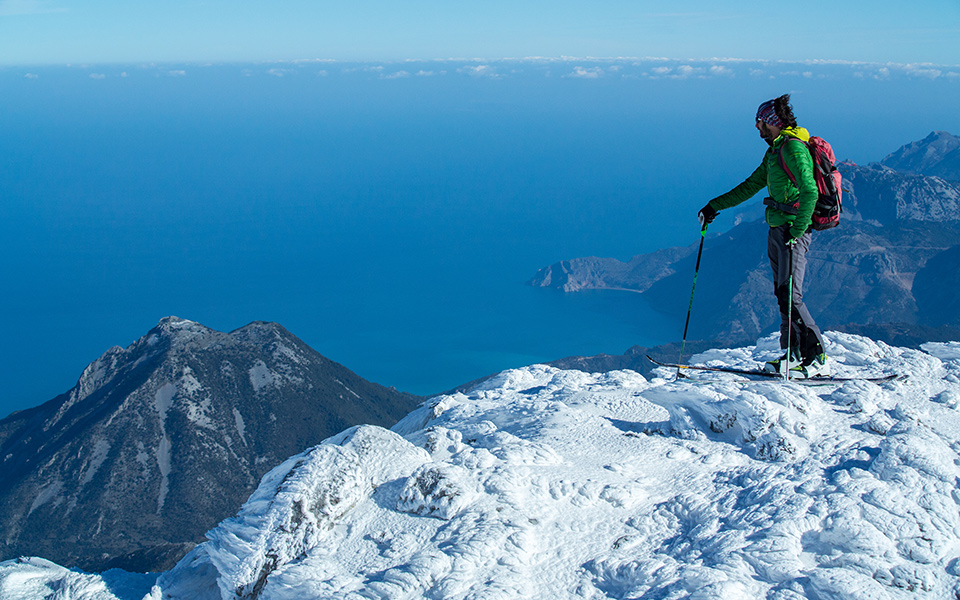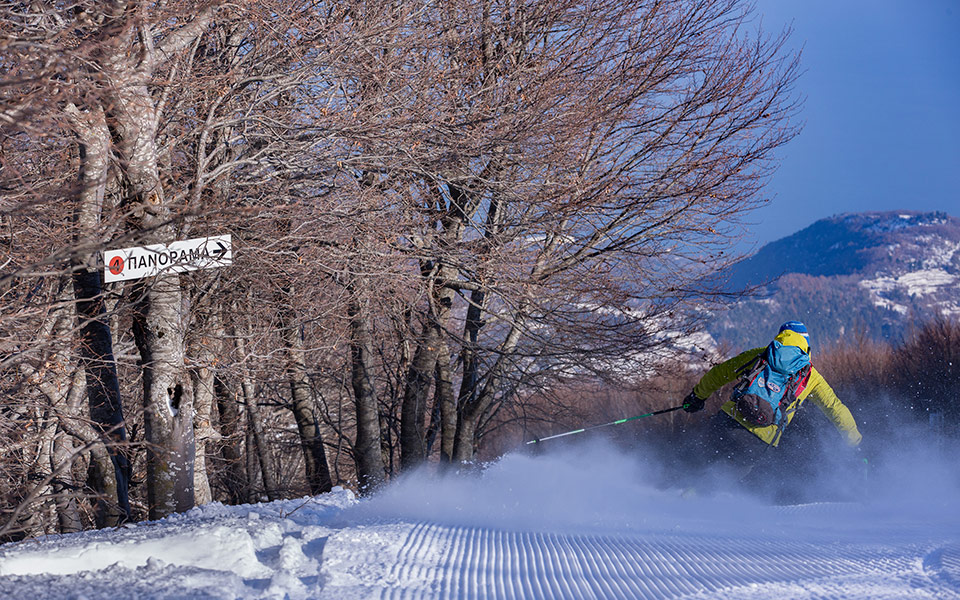Enchanted by the Greek mountains, Constantine Papanicolaou left his home state of California and came to Greece where he began filming Frozen Ambrosia, a self-financed ski film that is a stunning homage to Greece’s little-known winter mountain playgrounds.
Papanicolaou came with plenty of experience, being an accomplished cinematographer who specializes in skiing and snowboarding films, and who has filmed some of the best athletes in the world.
Frozen Ambrosia Trailer from Frozen Ambrosia on Vimeo.
The film, available on the website frozenambrosia.com, has been out for about a year, exposing new audiences to snowy landscapes from Olympus to Psiloritis in Crete. The website is also a font of useful information for skiers and snow-boarders looking to plan their own ski-touring adventures in Greece’s pristine mountains.
Now the 42-year-old producer and director is preparing a sequel that will focus on the mountains of Crete. We caught up with him to find out more about his projects, and what Greece’s mountains have to offer.

What motivated you to visit Greece and start filming?
A couple things. First, I never learned to speak Greek, and that bothered me a lot. Second, after seeing pictures online and looking at Google Earth, I really wanted to explore the Greek mountains. Third, the embarrassing news on TV about the economic crisis made me frustrated. I thought a movie about ski and snowboard in Greece could be a nice distraction.
Which locations did you visit? What are the highlights of this journey?
Most of the story takes place on Olympus. Also, I visited and filmed in [the mountains of] Karpenisi, Psiloritis, Parnassos, Vasilitsa, 3-5 Pigadia, Dirfys, Tymfi, Smolikas and Tzoumerka. Every place was special. The highlights were of course the experience on Olympus, which is a magical place as you see in the film. But every region and mountain in Greece had something special to offer. That’s one of the reason I love it here. Every mountain is different.

© Constantine Papanicolaou / FrozenAmbrosia.com
How do the Greeks react when they watch the movie? Do they know about all these incredible mountains?
For the Greeks that live in the mountains, and for the people who go hiking and climbing every weekend, it’s no surprise that this beauty exists. However a large plurality of Greeks in the cities, and Greeks in the diaspora, are completely mind blown. Over the past 40 years, as the summer beach scene has exploded, everyone seems to have forgotten that Greek culture is just as much a mountain culture as it is a sea-faring culture. It’s a rare combination, these two together, and perhaps the reason why this place is so special.
Which of the locations that you visited are the most promising in developing winter tourism?
The more correct approach I believe is to focus on developing mountain tourism, of which winter tourism is one component. Winter is the most exotic and picturesque season, and so it’s the best way to sell a mountain region. However most of the income comes in summer, simply because people have more vacation time during summer. This is the way it works everywhere. From this perspective, I can say that all the mountain regions of Greece have big potential in the coming years. The question is which ones will step forward and take the lead.
Winter in Greece Highlights 2017 from Frozen Ambrosia on Vimeo.
Are people from abroad usually surprised to find out that there’s a charming part of Greece beyond sea, sun and beaches?
When I talk to people in Europe and the States and I tell them that a winter vacation in Greece is just like a summer vacation in the islands but that you’re on a mountain with skis and snowboard, they instantly get it. Because the truth is people don’t fall in love with Greece because of the beaches and the sea. They fall in love with the filoxenia, the food, the history, the culture, the people. There’s just as much of that in the mountains as there is by the sea.
What kind of difficulties does a visitor in the Greek mountains face?
Compared with other mountain destinations in the Alps or the US, the Greek mountains are very undeveloped. This is great for a certain type of visitor who is more adventurous. However to grow the mountain tourism beyond a small niche market it needs to more organized. For example, there needs to be a full-time national mountain rescue team equipped with their own specialized helicopters. The rescue teams now are mostly volunteer and operate on foot. The only air support they get comes from large naval helicopters, which don’t do well maneuvering in the mountains.
Ancient Olympos Descents from Frozen Ambrosia on Vimeo.
Was it difficult to move from one location to the other? Not at all, especially with the new toll roads. These highways are the best thing ever for touring the Greek mountains. It used to take 5-6 hours to get from the Athens or Thessaloniki to the mountains. Now it takes just a few hours. The roads in the mountains are fine in my opinion. Certainly they are not all in the greatest of shape, however this is part of the adventure of traveling in the mountains in Greece.
Why should a ski enthusiast choose to visit Crete in the winter instead of another, more developed winter destination?
Precisely because it’s undeveloped, and because it’s Crete and Greece. It’s important to say that it’s not for everyone. For example, for someone who wants to stay at a Ritz Carlton and who wants to ski hundreds of kilometers of perfectly manicured pistes, it’s not a good choice. However, for someone who is interested in a more rustic environment, and who prefers to hike up the mountain before skiing down, Greece offers an exceptional experience. It may sound crazy, the idea of walking up a mountain instead of taking a chairlift, however this is the trend in skiing right now.
Ski Touring Crete from Frozen Ambrosia on Vimeo.
Did you require or use any special equipment to shoot in the Greek mountains?
I kept it pretty simple for the film, just a camera and a tripod. To film in the mountains you have to be able to move fast. Too much equipment slows you down. Fortunately in the past year, a breakthrough has been made with new camera drones that are both portable and high resolution. Now I’m shooting almost everything with one of these small drones. Or as I prefer to call it, the dronaki.
Did you have a film crew?
There was no film crew because I didn’t have any funding for the project. Of course moving forward with new projects this will change. I did work with a number of musicians here in Greece to make the music for the film and this was a great experience. We recorded everything at a studio in Athens but nothing was planned or written out beforehand. I would play for them rough montages from my computer, then they would go into the booth and play something to match it.
Tell us a few things about your team.
The team basically consists of a large group of people, spread around the country, that love to hike, ski and snowboard. Depending on where the best snow conditions can be found, and depending on who has free time from work, we hike up a mountain, shoot photos and videos, and tell some fun stories. Everything we do we post on social media and on the website. If the photos and videos are compelling, people share them and the message slowly spreads that the Greek mountains have something serious to offer.

© Constantine Papanicolaou / FrozenAmbrosia.com
Who supported you financially?
Financially I’ve been on my own with this project. In the beginning I thought about trying to get money from the large corporate sponsors of my past projects but decided against doing so. If I had gone this route, the film would not have featured any Greek skiers or snowboarders. It would have been a couple of famous Europeans or Americans coming to Greece to show off. That film has already been made, and frankly it wasn’t any good.
Did the local communities and individuals help you during filming? What were some of your most memorable experiences?
Yes the people in the mountain communities understood right away what I was trying to do and embraced it. They opened their homes to me, showed me important places to film and, most importantly, the best places to ski. Some of the most memorable moments were visiting Crete and Psiloritis for the first ever PierraCreta competition. Also, the time I spent in Karpenisi with the Velouchi Freeski team was fantastic. Cafe in the plateia in the morning, then up the mountain for ski-touring, then back to town in the afternoon for souvlaki. It was the quintessential Greek ski experience.
Skiing is Movement from Frozen Ambrosia on Vimeo.
What have you been doing since the movie came out?
Last winter, with the support of the mountaineering community in Greece, and some of the mountaineering clubs, I screened the film in every region of the country, a total of 24 times. Over the summer I screened the film in several Greek film festivals in the USA. Then, during the autumn months, I visited a number of mountain film festivals in Europe for more screenings. The plan for this winter is to spend more time in Crete with the PierraCreta team. It’s amazing what has been happening the past few years with PierraCreta and the explosion of ski touring in Lefka Ori [the White Mountains] and Psiloritis. Also, the second weekend of February I will be at the Snow Leopard event in Ziria in the Peloponnese, which is going to be huge this year. If you are curious about ski touring, come to the Snow Leopard event. You won’t be disappointed.
Was it a one-off project or should we expect a sequel?
Frozen Ambrosia started as a simple ski video but it’s grown into something much bigger. So yes, there will be a sequel, and Crete has something big to do with it. That’s all for now!











